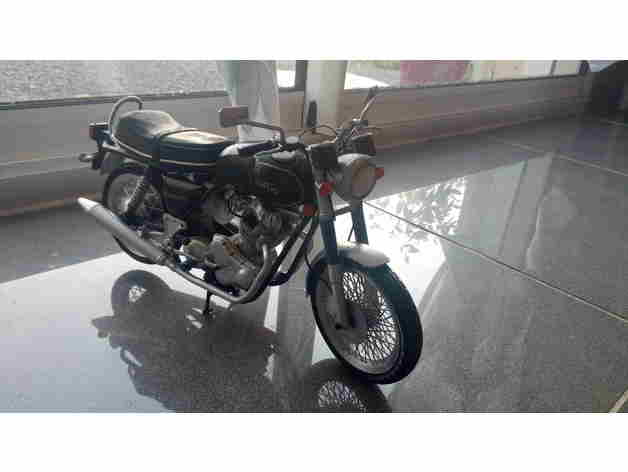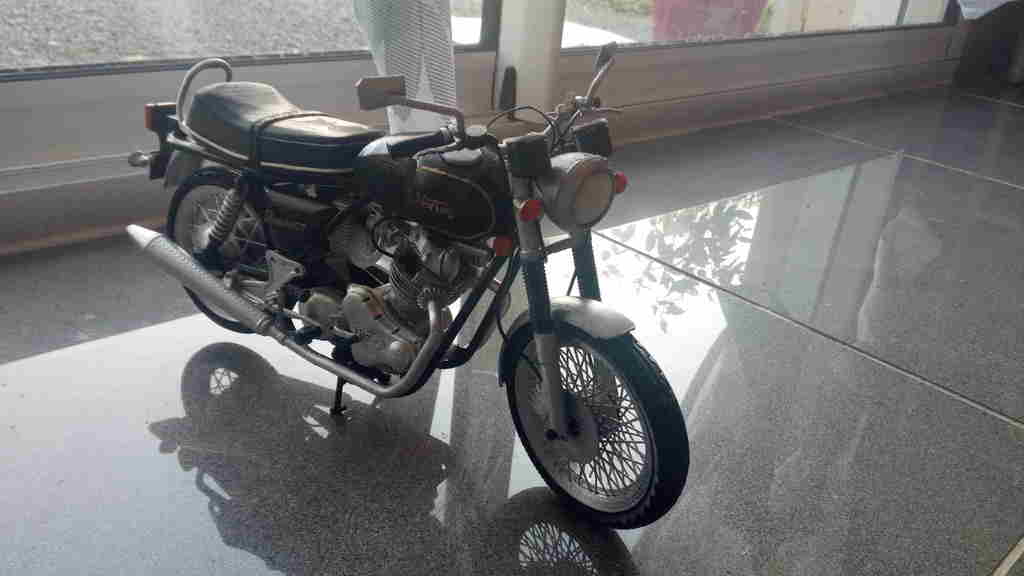- Joined
- Oct 28, 2009
- Messages
- 1,482
If copper anti-seize created a corrosion problem on the exhaust of a Commando, nobody would use bronze threaded inserts or bronze nuts. Depending on the alloy, bronze is about 88 per cent copper.
After reading the exhaust nut thread and watching Jims heat expansion tests, i ordered a set of aluminium exhaust nuts from Andy Molnar now.
Aluminium in Aluminium is prone to seize and Andy states that the nuts should be inserted with copper anti seize.
I am somewhat unhappy with the though of using copper on aluminium because as far as i know the copper would act as a cathode and the aluminium as an anode.
Meaning the copper would eat the aluminium and maybe ruin the threads.
On the other hand, the galvanic corrosion also needs an electrolyte to work between the two metals.
... and lots of people use a blob of copper paste on the spark plug threads.
The galvanic potential difference between Nickel and Aluminium is even higher.
Zinc would be the other way round (Aluminium would be the cathode and Zinc the Anode)
In the end i will go for ceramic antiseize now.
Whats your opinion ?
Or am i just a natural worrier ?
Its not about the weight, Its about the same heat expansion as the head.Aluminium nuts? I wouldn't do that. Just because I wouldn't do that. They are cheap, and they are light. But, does the weight saving add up to much?
What I have done is used stainless nuts from Pat Seager. And I just bought a second set. Really, they aren't heavy. See below link. Scroll down for a lot of Commando stuff. What they aren't is cheap.
And I still tend to put on a bit of copper anti seize, mainly because the nuts are sometimes hard to start. Rigid mounted engine and fairly rigid mounted exhaust impacts that, Commando should be easier,
View attachment 112337
Just remember ...
Just remember ...
I AM GERMAN !
Germans know everything better.
seds wai wi aar so popular all around se wörld
Or something like Mazak, used in many post WW2 British cars for cast items like door handles. The Chrome was supposed to protect the Mazak!Collectors of old german model trains from the 1920s know a phenomenon called "zinc pest". Turned out that, because of the metal shortages after WW1, they used a zinc alloy that was contaminated with other metals. Those parts simply deteriorate to dust. It also happens to some old BING carburettors made of pot metal.
I'd like to order a set of those beads,... but until they get here...
I have a galvanic reaction question as well. I have CBR600 fork dampers installed in my commando. I turn down and thread the fork cap nuts to fit the commando forks, so it's bare aluminum and steel. I've looked at the galvanic metals chart and that combination isn't highly galvanic at all, so without the presence of an electrolitic liquid, it would almost certainly not be an issue.
Wtbs, I was thinking about doing an "at home" hard anodize to strengthen the aluminum threads a bit, being that 20 TPI is such a fine thread. Anyone here do an at home hard anodize to anything threaded??
** Steve, Is mazak the same as Zamak? The gears on my lathe are made of zamak. So far they are ok, but they have a reputation for being crap....

This Beinhart guy....
Seams like fun guy, always after the bier...
I’ve run bare alloy fork top nuts for years without issue (standard on Maxton fork conversions). I’ve been using a thin smear of silicone grease and all is good.I'd like to order a set of those beads,... but until they get here...
I have a galvanic reaction question as well. I have CBR600 fork dampers installed in my commando. I turn down and thread the fork cap nuts to fit the commando forks, so it's bare aluminum and steel. I've looked at the galvanic metals chart and that combination isn't highly galvanic at all, so without the presence of an electrolitic liquid, it would almost certainly not be an issue.
Wtbs, I was thinking about doing an "at home" hard anodize to strengthen the aluminum threads a bit, being that 20 TPI is such a fine thread. Anyone here do an at home hard anodize to anything threaded??
** Steve, Is mazak the same as Zamak? The gears on my lathe are made of zamak. So far they are ok, but they have a reputation for being crap....

Welcome to Mazak Corporation | Mazak Corporation
Yamazaki Mazak - The Global Leader in Machine Toolswww.mazakusa.com
I’ve run bare alloy fork top nuts for years without issue (standard on Maxton fork conversions). I’ve been using a thin smear of silicone grease and all is good.
There’s no harm in anodising if you so wish, but it’s not strictly necessary.
Just remember ...
I AM GERMAN !
Germans know everything better.
seds wai wi aar so popular all around se wörld


